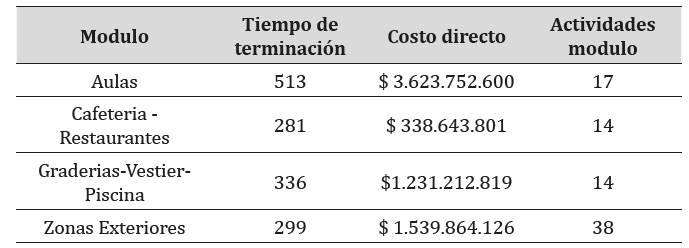Non-dominated NSGA-II genetic algorithm for schedule acceleration considering the discrete time-cost compensation problem (DTCTP) in a construction project
Algoritmo genético no dominado NSGA-II para la aceleración de programa considerando el problema de compensación discreta tiempo-costo (DTCTP) en un proyecto de construcción


This work is licensed under a Creative Commons Attribution-NonCommercial-NoDerivatives 4.0 International License.
Copyright statement
The authors exclusively assign to the Universidad EIA, with the power to assign to third parties, all the exploitation rights that derive from the works that are accepted for publication in the Revista EIA, as well as in any product derived from it and, in in particular, those of reproduction, distribution, public communication (including interactive making available) and transformation (including adaptation, modification and, where appropriate, translation), for all types of exploitation (by way of example and not limitation : in paper, electronic, online, computer or audiovisual format, as well as in any other format, even for promotional or advertising purposes and / or for the production of derivative products), for a worldwide territorial scope and for the entire duration of the rights provided for in the current published text of the Intellectual Property Law. This assignment will be made by the authors without the right to any type of remuneration or compensation.
Consequently, the author may not publish or disseminate the works that are selected for publication in the Revista EIA, neither totally nor partially, nor authorize their publication to third parties, without the prior express authorization, requested and granted in writing, from the Univeridad EIA.
Show authors biography
Sometimes after scheduling a project, it is necessary to shorten its duration. There are many factors that force to crash the duration. Some reasons may be saving costs, early commissioning or avoiding potential risks. In this case, it is necessary to allocate more resources to activities to shorten their duration while trying to invest as little money as possible. The time–cost tradeoff problem is one important problem in project scheduling. In this study the time–cost tradeoff problem is aborded considering a discrete approach and it is solved using a non-dominated genetic algorithm. The application in a construction project identified a Pareto front that managers could use for decision making. Managers were able to analyze different scenarios to meet delivery date, costs, and scope.
Article visits 382 | PDF visits 221
Downloads
- Adam, A., Josephson, P.-E. and Lindahl, G. (2015) ‘Implications of Cost Overruns and Time Delays on Major Public Construction Projects’, in Proceedings of the 19th International Symposium on Advancement of Construction Management and Real Estate. Berlin, Heidelberg: Springer Berlin Heidelberg, pp. 747–758. doi: 10.1007/978-3-662-46994-1_61.
- Agdas, D. et al. (2018) ‘Utility of Genetic Algorithms for Solving Large-Scale Construction Time-Cost Trade-Off Problems’, Journal of Computing in Civil Engineering, 32(1). doi: 10.1061/(ASCE)CP.1943-5487.0000718.
- Akkan, C., Drexl, A. and Kimms, A. (2005) ‘Network decomposition-based benchmark results for the discrete time-cost tradeoff problem’, European Journal of Operational Research, 165(2), pp. 339–358. doi: 10.1016/j.ejor.2004.04.006.
- Aminbakhsh, S. and Sonmez, R. (2016) ‘Discrete particle swarm optimization method for the large-scale discrete time-cost trade-off problem’, Expert Systems with Applications, 51, pp. 177–185. doi: 10.1016/j.eswa.2015.12.041.
- Aminbakhsh, S. and Sonmez, R. (2017) ‘Pareto Front Particle Swarm Optimizer for Discrete Time-Cost Trade-Off Problem’, Journal of Computing in Civil Engineering. doi: 10.1061/(asce)cp.1943-5487.0000606.
- Anagnostopoulos, K. P. and Kotsikas, L. (2010) ‘Experimental evaluation of simulated annealing algorithms for the time-cost trade-off problem’, Applied Mathematics and Computation. doi: 10.1016/j.amc.2010.05.056.
- Bettemir, Ö. H. and Talat Birgönül, M. (2017) ‘Network analysis algorithm for the solution of discrete time-cost trade-off problem’, KSCE Journal of Civil Engineering. doi: 10.1007/s12205-016-1615-x.
- De, P. et al. (1997) ‘Complexity of the Discrete Time-Cost Tradeoff Problem for Project Networks’, Operations Research, 45(2), pp. 302–306. doi: 10.1287/opre.45.2.302.
- De, P. P. et al. (1995) ‘The discrete time-cost tradeoff problem revisited’, European Journal of Operational Research, 81(2), pp. 225–238. doi: 10.1016/0377-2217(94)00187-H.
- Deǧirmenci, G. and Azizoǧlu, M. (2013) ‘Branch and bound based solution algorithms for the budget constrained discrete time/cost trade-off problem’, Journal of the Operational Research Society, 64(10), pp. 1474–1484. doi: 10.1057/jors.2012.14.
- Demeulemeester, E. et al. (1998) ‘New computational results on the discrete time/cost trade-off problem in project networks’, Journal of the Operational Research Society, 49, pp. 1153–1163. doi: 10.1057/palgrave.jors.2600634.
- Feng, C. W., Liu, L. and Burns, S. A. (1997) ‘Using genetic algorithms to solve construction time-cost trade-off problems’, Journal of Computing in Civil Engineering, 11(3), pp. 184–189. doi: 10.1061/(ASCE)0887-3801(1997)11:3(184).
- González, M. J. (2013) ‘La Lógica Fuzzy y su Aplicación en la Limitación de Recursos’, p. 93.
- Gray, C. and Larson, E. (2009) ‘Administración de proyectos’, p. 6.
- Hadjiconstantinou, E. and Klerides, E. (2010) ‘A new path-based cutting plane approach for the discrete time-cost tradeoff problem’, Computational Management Science, 7(3), pp. 313–336. doi: 10.1007/s10287-009-0115-6.
- He, Z. et al. (2017) ‘Variable neighbourhood search and tabu search for a discrete time/cost trade-off problem to minimize the maximal cash flow gap’, Computers and Operation Research, 78, pp. 564–577. doi: 10.1016/j.cor.2016.07.013.
- Hindelang, T. J. and Muth, J. F. (1979) ‘DYNAMIC PROGRAMMING ALGORITHM FOR DECISION CPM NETWORKS.’, Oper Res. doi: 10.1287/opre.27.2.225.
- Kaveh, A. and Mahdavi, V. R. (2015) ‘Colliding bodies optimization: Extensions and applications’, Colliding Bodies Optimization: Extensions and Applications, pp. 1–284. doi: 10.1007/978-3-319-19659-6.
- Ke, H., Ma, W. and Chen, X. (2012) ‘Modeling stochastic project time–cost trade-offs with time-dependent activity durations’, Applied Mathematics and Computation, 218(18), pp. 9462–9469. doi: 10.1016/J.AMC.2012.03.035.
- Li, H., Xu, Z. and Wei, W. (2018) ‘Bi-objective scheduling optimization for discrete time/cost trade-offin projects’, Sustainability (Switzerland), 10(8), p. 2802. doi: 10.3390/su10082802.
- Liberatore, M. J., Pollack-Johnson, B. and Smith, C. A. (2001) ‘PROJECT MANAGEMENT IN CONSTRUCTION: SOFTWARE USE AND RESEARCH DIRECTIONS’, JOURNAL OF CONSTRUCTION ENGINEERING AND MANAGEMENT, 127, pp. 101–107. doi: 10.1061/(ASCE)0733-9364(2001)127:2(101).
- Meyer, L. and Shaffer, L. (1965) The Critical-path Method, McGraw-Hill.
- Mitchell, G. and Klastorin, T. (2007) ‘An effective methodology for the stochastic project compression problem’, IIE Transactions (Institute of Industrial Engineers), 39(10), pp. 957–969. doi: 10.1080/07408170701315347.
- Mokhtari, H., Baradaran Kazemzadeh, R. and Salmasnia, A. (2011) ‘Time-cost tradeoff analysis in project management: An ant system approach’, IEEE Transactions on Engineering Management, 58(1), pp. 36–43. doi: 10.1109/TEM.2010.2058859.
- Moussourakis, J. and Haksever, C. (2010) ‘Project Compression with Nonlinear Cost Functions’, (February), pp. 251–260.
- Robinson, D. R. (1975) ‘DYNAMIC PROGRAMMING SOLUTION TO COST-TIME TRADEOFF FOR CPM.’, Management Science. doi: 10.1287/mnsc.22.2.158.
- Shahriari, M. (2016) ‘Multi-objective optimization of discrete time–cost tradeoff problem in project networks using non-dominated sorting genetic algorithm’, Journal of Industrial Engineering International, 12(2), pp. 159–169. doi: 10.1007/s40092-016-0148-8.
- Sonmez, R. and Bettemir, Ö. H. (2012) ‘A hybrid genetic algorithm for the discrete time-cost trade-off problem’, Expert Systems with Applications, 39(13), pp. 11428–11434. doi: 10.1016/j.eswa.2012.04.019.
- Tareghian, H. R. and Taheri, S. H. (2007) ‘A solution procedure for the discrete time, cost and quality tradeoff problem using electromagnetic scatter search’, Applied Mathematics and Computation, 190(2), pp. 1136–1145. doi: 10.1016/j.amc.2007.01.100.
- Tavares, L. . (1990) ‘A multi-stage non-deterministic model for project scheduling under resources constraints’, European Journal of Operational Research, 49(1), pp. 92–101. doi: 10.1016/0377-2217(90)90123-S.
- Vanhoucke, M. (2005) ‘New computational results for the discrete time/cost trade-off problem with time-switch constraints’, European Journal of Operational Research, 165(2), pp. 359–374. doi: 10.1016/j.ejor.2004.04.007.
- Vanhoucke, M., Demeulemeester, E. and Herroelen, W. (2002) ‘Discrete time/cost trade-offs in project scheduling with time-switch constraints’, Journal of the Operational Research Society, 53(7), pp. 741–751. doi: 10.1057/palgrave.jors.2601351.
- Wei, H., Su, Z. and Zhang, Y. (2020) ‘Preprocessing the Discrete Time-Cost Tradeoff Problem with Generalized Precedence Relations’. doi: 10.1155/2020/6312198.
- Wglarz, J. et al. (2011) ‘Project scheduling with finite or infinite number of activity processing modes - A survey’, European Journal of Operational Research, 208(3), pp. 177–205. doi: 10.1016/j.ejor.2010.03.037.
- Wiest, J. D. (1967) ‘A Heuristic Model for Scheduling Large Projects with Limited Resources’, Management Science, 13(6), p. B-359-B-377. doi: 10.1287/mnsc.13.6.b359.
- Wood, D. A. (2017) ‘Gas and oil project time-cost-quality tradeoff: Integrated stochastic and fuzzy multi-objective optimization applying a memetic, nondominated, sorting algorithm’, Journal of Natural Gas Science and Engineering. doi: 10.1016/j.jngse.2017.04.033.
- Yang, Y. et al. (no date) ‘Effect of Schedule Compression on Project Effort’, 2000(Cii).
- Zheng, D. X. M., Ng, S. T. and Kumaraswamy, M. M. (2005) ‘Applying pareto ranking and niche formation to genetic algorithm-based multiobjective time-cost optimization’, Journal of Construction Engineering and Management, 131(1), pp. 81–91. doi: 10.1061/(ASCE)0733-9364(2005)131:1(81).




